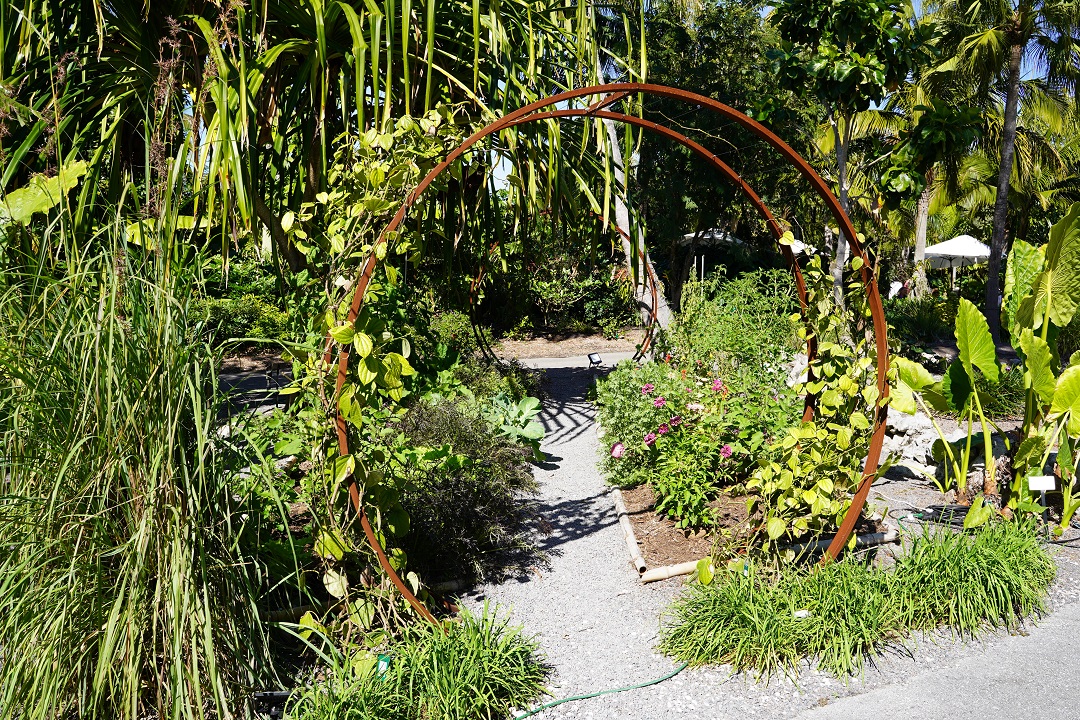
Enjoy this article, originally published in the Summer 2021 issue of Cultivate, the Garden magazine.
Summer in Southwest Florida isn’t for everyone, but if you are a plant person like all of us here at the Garden, the heat becomes a distant memory as you watch your plants thrive. Naples summers are ideal for a few reasons: warmth, sunlight, and RAIN! As plant people, we pray for rain, and over the summer months, we get a lot of it. Summer is the perfect time of year to plant your trees, prep your veggie beds, cut back shrubs, and watch everything in your garden flush out with new growth. The conditions are ideal for your ever-growing plants, but Southwest Florida summers are notorious for climbing temperatures, which can easily lead to dehydration. So make sure you’re drinking enough water, too, if you plan to be summer gardening.
Plant, plant, plant! (But check the forecast first.)
Whether you are a rookie or a veteran Southwest Florida gardener, there are a few tips and tricks you should know to navigate our slight change of seasons. Winter is not the ideal time for us at the Garden to undertake big plantings. We use the winter months as a time to develop plans and order new plants. The reason: Mother Nature’s all-natural sprinkler system — rain — is in full gear come summer, which acts as a supplement to irrigation to help the plants become established. One of the best times to get out and plant your trees is a summer day when it’s overcast with a slight drizzle, or when you know a big rain is coming.
Give that soil a refresh.
The Southwest Florida veggie schedule is just one of many ways we differ from northern climates. A general rule of thumb for us is to reverse the growing instructions for veggies on the back of the seed package. Over summer we will plant cover crops, such as sweet potatoes, which help stop soil erosion, suppress weeds, and protect the soil from losing nutrients due to sun exposure. We also solarize our veggie beds. Solarizing is when you lay a thick plastic over the top of your soil. This will kill any nematodes — parasitic roundworms — that can wreak havoc on your root systems; plus, it helps eradicate weeds and any weed seeds that might lay dormant in the bed.
Break out the pruners. And loppers. And chainsaws.
Summer months are also when we perform our cutbacks, or as we call it, renewal pruning. We do this in the summer so that the plants will have enough time to regrow before we have any danger of frost, which can damage freshly wounded plants. Now would be the time to take a step back and see what worked well for you last year, how you would like to keep certain shrubs maintained, and what didn’t work. Some plants respond well to a hard cutback, others can only take a slight trim, and some you might only selectively prune a few branches to encourage new growth.
It’s a simple matter of sunlight.
Another reason to do some of your heavier gardening in the summer months is the change of sun exposure. This can impact your placement of certain plants or your placement of your container gardens. I find myself constantly shuffling my container gardens around to adjust for growth, sunlight, and aesthetics. If you plant annuals in your containers, now is a good time to brainstorm what summer annuals you want to use and their ideal placement for summer sunlight!
 About the Author
About the Author
Lauren Hardy is a Gardener on the Horticulture Team at Naples Botanical Garden.


